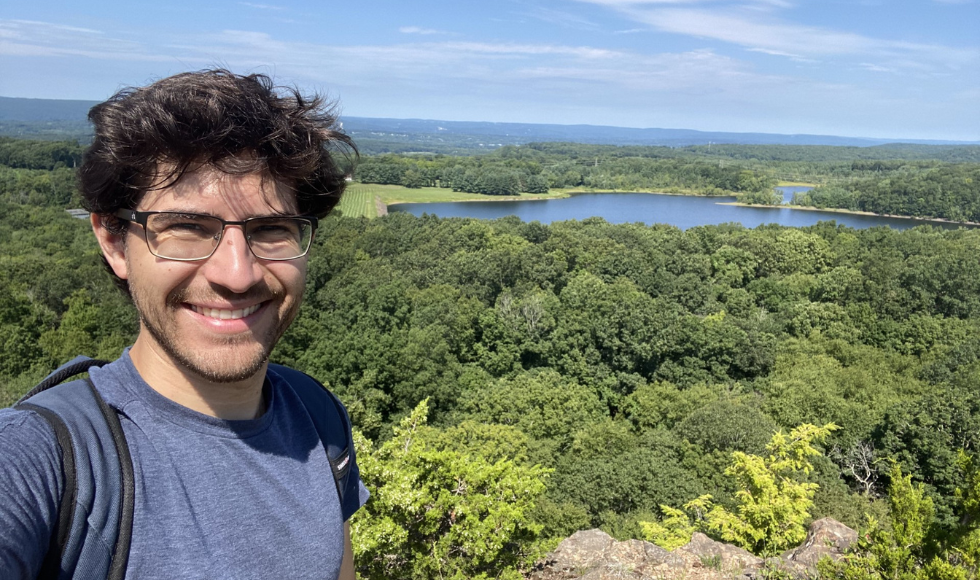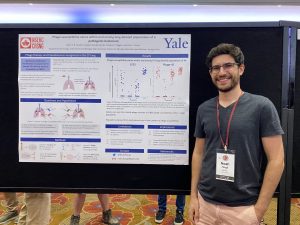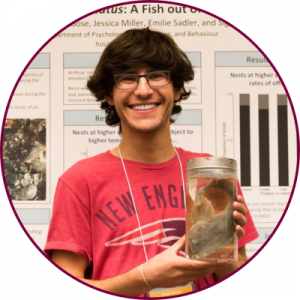Opening an on-ramp to undergraduate research

Alumni Noah Houpt, who is now a PhD student at Yale University, became a valued member of Sigal Balshine’s Aquatic Behavioral Ecology Lab during his time as an undergraduate at McMaster.
Sigal Balshine initially thought she was doing Noah Houpt’s mom a quick favour.
They knew each other well and shared a mutual connection to McMaster. Balshine’s a professor in the Department of Psychology, Neuroscience & Behaviour. Houpt was a second-year science student.
“To my horror and embarrassment, my mother reached out to Professor Balshine before I even got the chance to send an email and introduce myself,” says Houpt. “I can laugh about it now.”
Balshine, the Faculty of Science Research Chair in Aquatic Behavior Ecology, felt obliged to say yes to what she thought would be a quick pep talk for Houpt.
“But Noah’s passion and curiosity about evolution and ecology blew me away during our meeting,” says Balshine. “Despite his lack of lab experience, I decided to give Noah a chance.”
It’s a decision that paid big dividends for both Houpt and Balshine.
Houpt became a valued member of Balshine’s Aquatic Behavioral Ecology Lab, winning two undergraduate student research awards, and completing a third-year research project and fourth-year thesis there.
Houpt was involved in research that was published in academic journals and a lead author on two papers.
“Having those publications under my belt as an undergrad helped me win grant and scholarship money and get accepted into graduate programs,” says Houpt.
 After graduating from McMaster in 2019, Houpt completed a master’s degree at the University of Ottawa. He’s now a third-year PhD student in Professor Paul Turner’s lab at Yale University’s Department of Ecology & Evolutionary Biology.
After graduating from McMaster in 2019, Houpt completed a master’s degree at the University of Ottawa. He’s now a third-year PhD student in Professor Paul Turner’s lab at Yale University’s Department of Ecology & Evolutionary Biology.
“Professor Balshine’s mentorship gave me a lot of confidence,” says Houpt. “I’ve yet to come across another professor who is as active and enthusiastic in their mentorship of undergrads.”
Now, the Office of Undergraduate Research is aiming to increase and expand access to undergraduate research opportunities in the Faculty of Science like the ones Houpt benefitted from.
Jim Lyons, the office’s director, says he has had similar experiences like Balshine’s with the dozens of undergraduate students he’s supervised as a kinesiology professor and as the principal investigator in his Sensorimotor Neuroscience Lab.
“Undergrads have an originality of thought that never ceases to amaze,” says Lyons. “And few things compare to seeing the students you’ve supervised and mentored get accepted into grad schools around the world or launch their own successful careers outside of academia.”
Lyons is running the office together with program managers Sara Cormier and Sajeni Mahalingam, and experiential programming and outreach manager Sunita Nadella.

Supported by the Provost’s Strategic Alignment Fund as a three-year pilot project, the office is a first for McMaster.
The office aims to solve a problem for the Faculty of Science.
“Our challenge isn’t getting our 8,600 undergraduate students interested in research,” says Lyons. “They’re already keenly interested. Our challenge is finding ways to expand and enhance meaningful research opportunities for even more of our students. It’s a good problem to have.”
A focus will be on providing new opportunities for second-year students, to complement existing third-year research placement projects and fourth-year capstone thesis projects in the faculty.
Research-based skills workshops are rolling out and experiential placement courses are in development. Open lab meetings and shadowing graduate students are also planned.
A significant challenge is lab capacity, says Lyons.
To address this, the office is looking at developing early-year courses that would offer research opportunities and experiences without direct physical lab bench involvement. Teams of students, working under the supervision of senior graduate students and postdoctoral fellows, would carry out research projects up to the point of actual data collection.
In following how science research studies are conceived and developed, students would develop valuable skills like conducting literature reviews, developing testable hypotheses and methodologies, and research writing.
“Our goal with all of these initiatives is to give undergraduate students a solid foundation before they join a research group,” says Lyons.
“They’ll be ready to contribute from day one and that should help take some pressure off faculty, postdocs and grad students who’ve been doing this training on their own for decades.”
While the mission of the office is to expand research opportunities for undergrad students across the Faculty of Science, Lyons says the autonomy of departments, faculty investigators and research groups will be respected.
“It’s sacrosanct,” says Lyons.
“No one is going to tell our faculty colleagues to take on more undergraduate students. Not every research group currently has the capacity and there are labs that require advanced technical skills that undergraduate students have yet to develop. We’re here to consult and work with our colleagues to explore ways to welcome more undergrads into their research when they’re ready. This way, everyone will benefit.”
Equitable access to research opportunities is a priority for the office, adds Lyons.
“We want our office to be the on-ramp to research for all students. Not every undergrad has family connections or the confidence to ask a professor if they can join their research group. That student who doesn’t know how to get involved could be a future Nobel Prize winner.”
Or, a student like Houpt, who is now studying at an elite university. The PhD student credits the mentorship he received from Balshine as his ‘on-ramp’ to research.
“She invested so much effort and time by letting me run projects that I wasn’t fully prepared to do at the time,” says Houpt. “Professor Balshine guided me through them all and allowed me to learn by doing.”
For more on the Faculty of Science’s new Office of Undergraduate Research, go to our.science.mcmaster.ca
4 Things to Know Undergrad Research by Noah Houpt

1. Most of your course instructors have their own labs where they lead a team of researchers in scientific projects to learn new things about the world. If you’re interested in getting involved in that, many of them love bringing undergrads aboard their research teams. Under certain circumstances, you can even get paid to do research in these labs to help subsidize your tuition and living expenses.
2. Before joining a lab, talk with some members of the lab other than the professor (aka. the principal investigator, or PI) to gain some insight into the vibe of the lab and the PI’s mentorship style. It’s been my experience that mentorship for undergrads can vary substantially across labs. Some forms of mentorship may work better for you than others. For example, some PIs tend to be more “hands-on,” giving you lots of feedback and guidance, while other PIs let you explore your own interests with less oversight. Also, if your goal is to get on a publication as an undergrad, ask members of the labs you want to join whether undergrads are typically able to get on publications in that group. Try to pick a lab that studies something you’re interested in and has a vibe and mentorship style that suits you.
3. There are little pots of money that can help you get paid for doing research as an undergrad. Look into work-study programs through McMaster and into the National Sciences and Engineering Research Council’s (NSERC) Undergraduate Student Research Award (USRA). NSERC is a federal science funding agency that helps labs across Canada conduct research and their USRA program is designed to help undergrads get paid research experience in academic labs.
4. If you’re interested in research as a career, you’ll most likely have to do a research-based graduate program following undergrad as your next career stage. In Canada, that means doing a master’s or PhD program. While technically you would still be a student in these programs, most research-based graduate programs actually pay you a stipend that exceeds the tuition to help cover living expenses.


